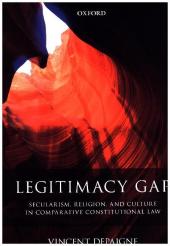 Neuerscheinungen 2017Stand: 2020-02-01 |
Schnellsuche
ISBN/Stichwort/Autor
|
Herderstraße 10
10625 Berlin
Tel.: 030 315 714 16
Fax 030 315 714 14
info@buchspektrum.de |

Vincent Depaigne
Legitimacy Gap
Secularism, Religion, and Culture in Comparative Constitutional Law
2017. 240 S. 241 mm
Verlag/Jahr: OXFORD UNIVERSITY PRESS; OUP OXFORD 2017
ISBN: 0-19-880382-6 (0198803826)
Neue ISBN: 978-0-19-880382-9 (9780198803829)
Preis und Lieferzeit: Bitte klicken
This book addresses the ´legitimacy gap´ created by the removal of religion as a source of legitimacy for the foundation of secular states, when many of the world´s states are still profoundly religious but require procedural, rather than substantive, grounds for constitutional arrangements.
This book provides an account and explanation of a fundamental dilemma facing secular states: the ´legitimacy gap´ left by the withdrawal of religion as a source of legitimacy.
Legitimacy represents a particular problem for the secular state. The ´secular´ in all its manifestations is very much linked to the historical rise of the modern state. It should not be seen as a category that separates culture and religion from politics, but rather as one that links these different dimensions. In the first part of the book, Depaigne explains how modern constitutional law has moved away from a ´substantive´ legitimacy, based in particular on natural law, towards a ´procedural´
legitimacy based on popular sovereignty and human rights.
Depaigne examines three case studies of constitutional responses to legitimacy challenges which articulate the three main sources of ´procedural´ legitimacy (people, rights, and culture) in different ways: the ´neutral model´ (constitutions based on the ´displacement of culture´); the ´multicultural model´ (constitutions based on diversity and pluralism); and the ´asymmetric model´ (constitutions based on tradition).
Even if secularization can be considered European in its origin, it is best seen today as a global phenomenon, which needs to be approached by taking into account the particular cultural dimension in which it is rooted. Depaigne´s detailed study shows how secularization has moved either towards ´nationalization´ linked to a particular national identity (as in France and, to some extent, in India)-or towards ´de-secularization´, whereby secularism is displaced by particular cultural norms, as in
Malaysia.
Dr Vincent Depaigne is a policy officer in the Fundamental Rights Unit, Directorate General for Justice, at the European Commission, dealing in particular with the dialogue between the European Commission and religious and non-confessional organizations. Dr Depaigne received his PhD in Law from the School of Oriental and African Studies, London, and a MSt in international human rights law from Oxford University.


